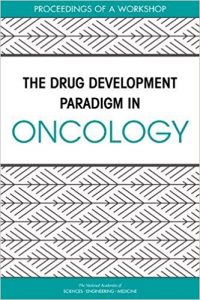The Drug Development Paradigm in Oncology: Proceedings of a Workshop

[amazon template=iframe image2&asin=0309457947]
Advances in cancer research have led to an improved understanding of the molecular mechanisms underpinning the development of cancer and how the immune system responds to cancer. This influx of research has led to an increasing number and variety of therapies in the drug development pipeline, including targeted therapies and associated biomarker tests that can select which patients are most likely to respond, and immunotherapies that harness the body’s immune system to destroy cancer cells. Compared with standard chemotherapies, these new cancer therapies may demonstrate evidence of benefit and clearer distinctions between efficacy and toxicity at an earlier stage of development. However, there is a concern that the traditional processes for cancer drug development, evaluation, and regulatory approval could impede or delay the use of these promising cancer treatments in clinical practice. This has led to a number of efforts—by patient advocates, the pharmaceutical industry, and the Food and Drug Administration (FDA)—to accelerate the review of promising new cancer therapies, especially for cancers that currently lack effective treatments. However, generating the necessary data to confirm safety and efficacy during expedited drug development programs can present a unique set of challenges and opportunities.
To explore this new landscape in cancer drug development, the National Academies of Sciences, Engineering, and Medicine developed a workshop held in December 2016. This workshop convened cancer researchers, patient advocates, and representatives from industry, academia, and government to discuss challenges with traditional approaches to drug development, opportunities to improve the efficiency of drug development, and strategies to enhance the information available about a cancer therapy throughout its life cycle in order to improve its use in clinical practice. This publication summarizes the presentations and discussions from the workshop.
DOWNLOAD THIS BOOK FREE HERE
http://upsto.re/FZnEZTX
DISCLAIMER
This website strictly complies with DMCA Digital Copyright Laws..
Please be clear that we (emedicalbooks.com) do not own copyrights of these e-books. The intention behind sharing these books and educational material is to provide easy access to medical students, doctors and other individuals related to the field of medical science, "thus only for educational purpose". We highly encourage our readers to purchase this content from the respected publishers. If anyone holding copyrights wants us to remove this content, please contact us rightaway. All books and educational material on emedicalbooks.com are free and NOT HOSTED ON OUR WEBSITE. If you feel that your copyrights have been violated, then please contact us immediately. You may send an email to emedical1521@gmail.com for all DMCA / Removal Requests. emedicalbooks.com doesn’t have any material hosted on the server of this page, only links to books that are taken from other sites on the web are published and these links are unrelated to the book server. emedicalbooks.com server doesnot store any type of book or material. No illegal copies are made or any copyright © and / or copyright is damaged or infringed since all material is free on the internet.







